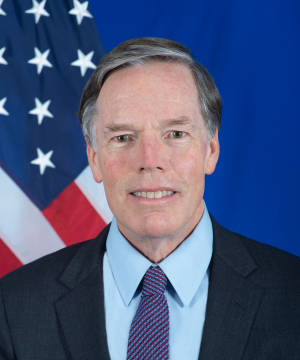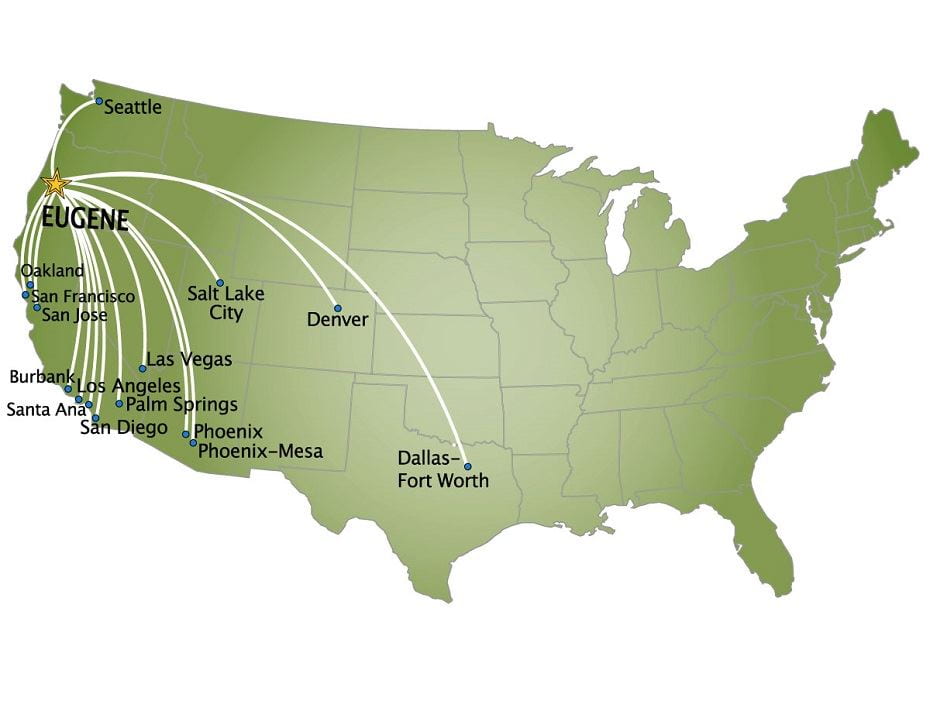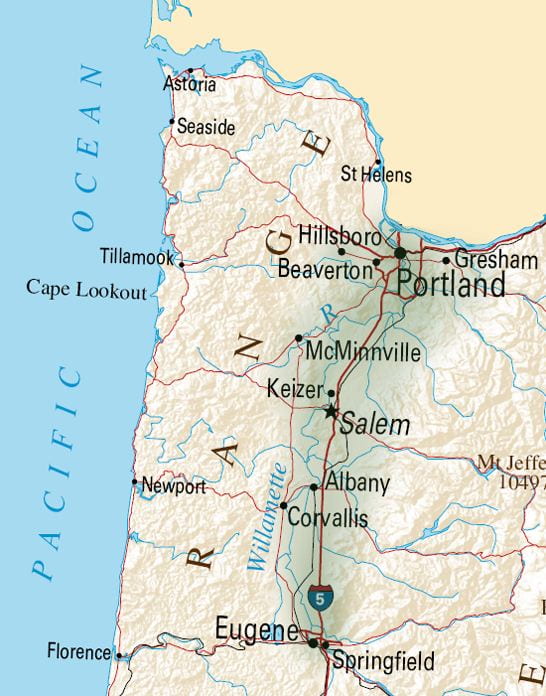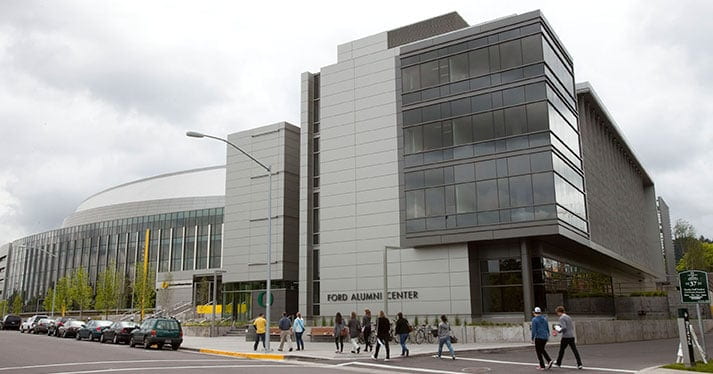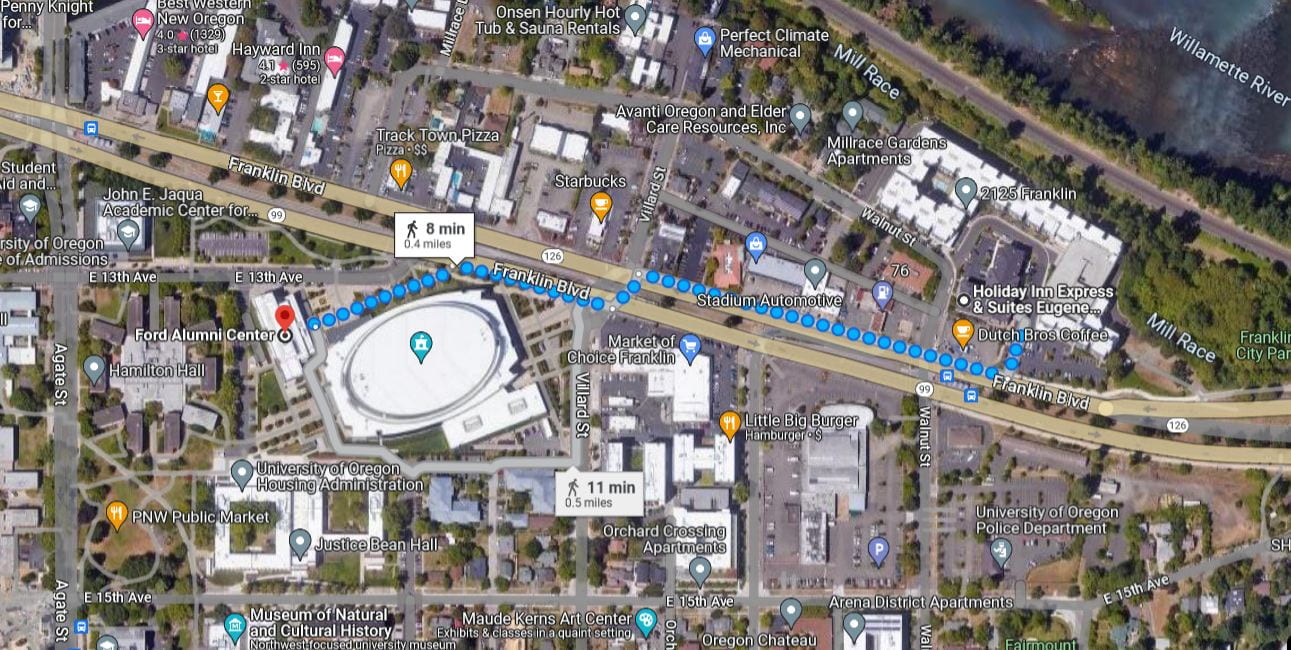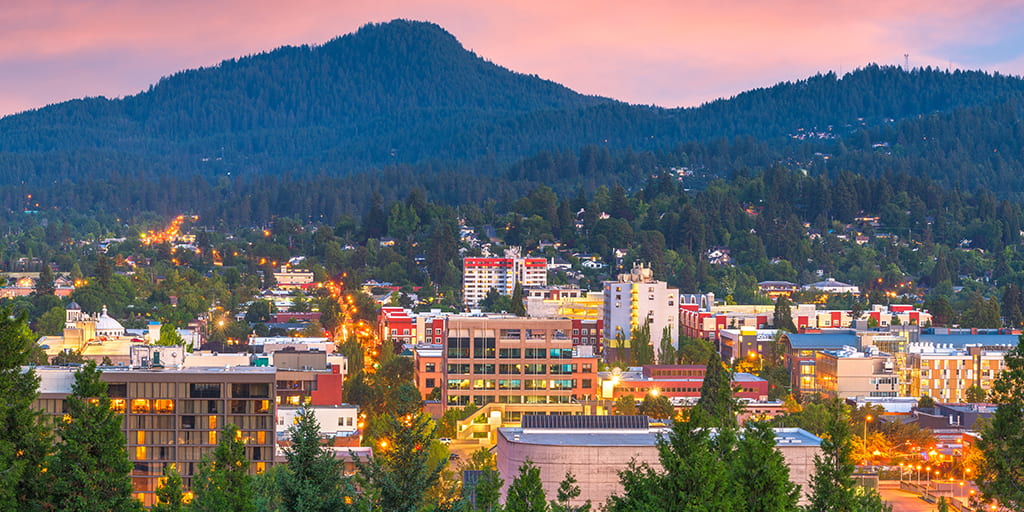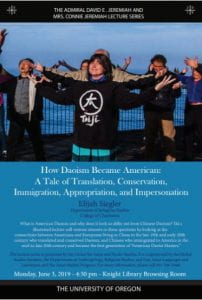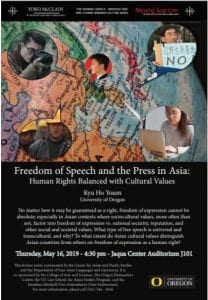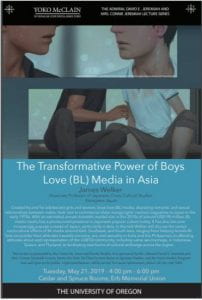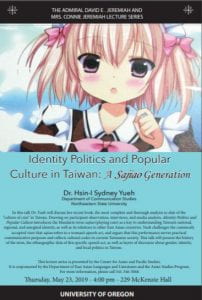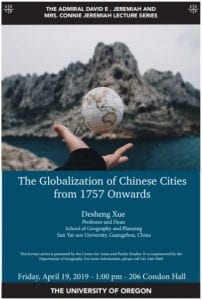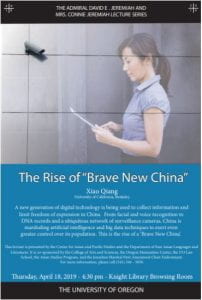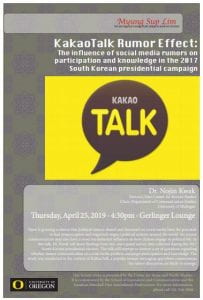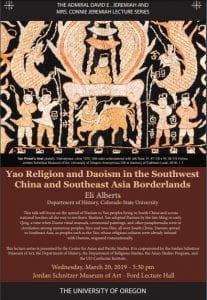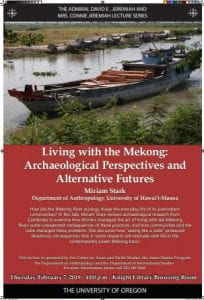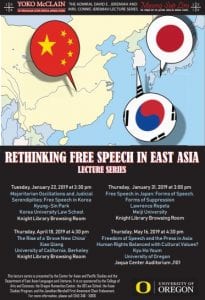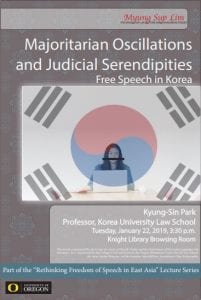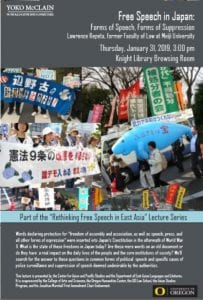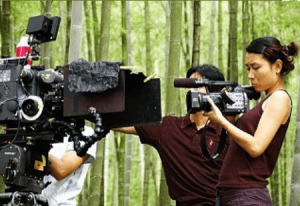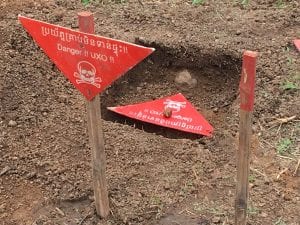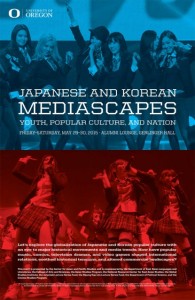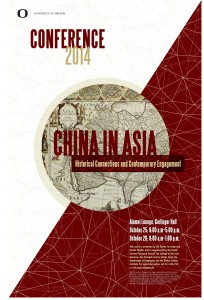
China-in-Asia: Historical Connections and Contemporary Engagement
Fridays, Fall term at 10:00 am
All talks will be free to the public and take place on Zoom
Zoom Meeting ID: 940 7063 0564
Zoom Passcode: 202020
Friday, October 9, 2020 @ 10 am
David R. Meyer, Washington University in St. Louis, USA
“China’s ‘Belt & Road’ Options in a Trade War with the United States”
China’s “One belt, one road” (Belt & Road) initiative is transforming global supply chains, especially across Asia, the Middle East, and Europe, and also extending to Africa. The supply chain linkages are embodied in the Silk Road Economic Belt and New Maritime Silk Road. One key part of the initiative aims to propel economic development within Asia. China’s initiative now includes economies that, in aggregate, along with China, comprise a total economy that surpasses the United States. Trade of China with “Belt & Road” economies now exceeds that with the United States. Regional groupings of countries in the “Belt & Road” initiative diverge significantly in relative importance to China. This suggests China’s trade relationships with these countries will take on diverse approaches. Southeast Asia emerges as a critical economic region for China’s future economic growth and trade, implying that countries of that region will play a major role in the “Belt & Road” initiative. The paradox of the “trade war” between China and the U.S. points to a realignment of the global economy—the U.S. raises the stakes in the “trade war” even as its importance to China is in long-term relative decline.
Tao Hu, Lakestone Institute for Sustainable Development, USA and China
“How Could China Promote Sustainable Development Goals along Belt and Road Countries? A Renewable Energy Example”
Friday, October 23, 2020 @ 10 am
Juliet Lu, Cornell University, USA
“From Peripheral to Pivotal: Province Level Powers in China’s Global Expansion”
China’s global expansion is often portrayed as directed from Beijing through central state political agreements and initiatives. In reality, particularly in engaging Asian countries that neighbor China, province level powers play a pivotal role in facilitating the flows of capital, goods, people and ideas. This is exemplified by the case of Chinese economic and political interactions with Laos, most of which are channeled through actors and institutions in Yunnan Province. This talk will describe three channels through which China’s engagement with Laos is shaped by actors in Yunnan: through Yunnan provincial government authorities and the policies and cross-border cooperation initiatives they have established; through vibrant social and business networks, many built on cultural, ethnic, and linguistic ties that predate the establishment of the P.R.C.; and through the unique logics of spatial control and resource management which defined Yunnan’s path to development and are now being transplanted into the Lao context. The talk aims to reframe the spatial lens through which we approach Chinese contemporary engagements in Asia, centering the province and more specifically the borderlands, and tracing political, personal, and ecological structures that are more clearly active in these places. It also explores the implications of China’s global expansion for certain actors and interests in border provinces. It suggests that Yunnan provincial leadership use China’s increasing openness to assert independence from Beijing, and that China’s central-state resources can be more easily captured by business and political interests at the province level as they flow toward and beyond the borderland regions.
Kean Fan Lim, Newcastle University, UK
“The Geoeconomics and Geopolitics of Sino-Singaporean Relations”
This talk explores China-Singapore relations from two seemingly contradictory trajectories – deepening geo-economic integration and differing geopolitical orientations. Once denigrated as a symbol of imperialist ‘running dogs’, Singapore became a governance ‘model’ for Chinese policymakers in the post-Mao era. Economic ties soon deepened. Since 2013, China became Singapore’s largest trading partner, and Singapore became the largest source of FDI in China. Following the launch of China’s ‘Go Abroad’ strategy in the early 2000s, Chinese FDI in Singapore grew exponentially. Singapore’s geo-economic importance became more pronounced following US policy to remove Hong Kong’s unique geopolitical status in 2020. There is every sign that Chinese foreign trade policy will leverage on Singapore’s global interconnections to circumvent hostile trading policies. Sino-Singaporean relations are inherently fragile, however, because of different geopolitical orientations. The Singapore government has forged a close relationship with the US and is a frequent port-of-call for the US navy. It maintains military links with Taiwan, a polity that China regards as its domestic province. Singapore’s position on China’s territorial claims in the South China Sea is also aligned to those of ASEAN, within which contains much opposition to those claims. This talk therefore presents Sino-Singaporean relations as primarily economistic, with China tapping on Singapore’s existential need to attract foreign investments and sidestepping fundamental geopolitical differences.
Eileen Otis, University of Oregon, USA
“Walmart’s New Road into China”
Walmart ascended to the pinnacle of the global economy in the 1990’s by deploying sophisticated logistics technology to direct massive imports from China onto its U.S. retail shelves. Currently, while there is growing attention to China’s outward state investment focusing on the “Belt and Road Initiative,” another dimension of China’s adjustment to its growth into a superpower economy has been an attempt to shift away from dependence on export manufacturing, especially its reliance on the U.S. as a major consumer of its products. The recent “trade war” has only exacerbated this trend. In the nation’s attempt to shift from producer to consumer, one of the key global actors, Walmart, is expanding its role from buyer to investor, as it builds stores and distribution warehouses across China. This investment is emblematic of the rise of global retail brands, an historically unprecedented phenomenon. My main purpose in this talk is to place the rise of Walmart as a retailer in China, within the larger context of global economic dynamics, focusing on China and the U.S. I treat the firm as an example of merchant capital, in which economic actors who control demand dominate producers. The presentation will discuss the adaptions required by the firm as it settles into the Chinese consumer market and its impact on retail workers in China.
Friday, October 30, 2020 @ 10 am
Oyuna Baldakova, Freije University Berlin, Germany
“China’s Solution for the Global South: Study of Belt and Road Investments in Kazakhstan and Kyrgystan”
China’s Belt and Road Initiative (BRI) has attracted heightened international attention and inspired polarizing interpretations. Critics believe that the initiative could be a ‘debt trap’ used to extract geostrategic concessions from debtors. Proponents, on the other hand, contend that China, replicating its own success story, can help countries in the Global South overcome their structural bottlenecks and enable them to repeat the trajectory of China’s rapid economic growth. This paper presents an analysis of the BRI from the perspective of international development studies. Comparing China’s BRI investments in two Central Asian countries – Kazakhstan and Kyrgyzstan – it argues that proposed BRI projects often reflect China’s internal logic of development, but that the extent and quality of implementation varies largely across the BRI countries. The paper addresses the financial set up of projects, which play an important role and are frequently overlooked in BRI analyses.
Jessica diCarlo
University of Colorado, Boulder, USA
“Behind the Spectacle of the BRI: Grounding Global China in Laos”
In this talk, I examine China’s rise in global development through three inter-related projects in Laos—the country’s first railroad, Boten special economic zone, and the Laos-China Economic Corridor, all of which have been subsumed under the banner of the Belt and Road Initiative. The BRI, unprecedented in scope and scale, suggests a new era of Chinese development through infrastructure. Yet, considerations of the social, political, and material dynamics at play in host countries, particularly with longer legacies of Chinese investment and engagement, tend to be surface level. Academic inquiry has focused on the BRI’s geopolitical implications as well as the economic dimensions of export infrastructure as a ‘spatial fix’ for China’s chronic overproduction crisis. Yet, Tsing (2005, 74) reminds: “For the aspirations of international investors and national elites to emerge as more than a moment’s daydream…they must be made tangible on a regional landscape. They must engage people, places, and environments”. To understand investments are ‘made tangible’, I zoom out and begin by outlining the BRI in Laos and unpacking the legacies and relations that have produced the current moment of China’s investment in the Lao context. In doing so, I challenge sweeping statements of imperialism and situate megaprojects more contextually and historically. I then focus on the railway and the additional investments and plans for special economic zones and corridors that it motivated. I argue that these transnational infrastructure projects produce new development imaginaries, act as (geo)political and state-making tools for both the Lao and Chinese states, and reconfigure local land politics and law. In doing so, I demonstrate that rather than a single global force with local impacts, ‘China’ and the ‘Chinese’ projects I study are co-produced with Lao state and non-state actors and through multiple, sometimes incongruous forces.
Friday, November 6, 2020 @ 10 am
Nianshen Song
University of Maryland Baltimore County, USA
“Border, Modern, and East Asia: The Tumen River Demarcation 1881-1919”
Until the late nineteenth century, the Chinese-Korean Tumen River border was one of the oldest, and perhaps most stable, state boundaries in the world. Spurred by severe food scarcity following a succession of natural disasters, from the 1860s, countless Korean refugees crossed the Tumen River border into Qing-China’s Manchuria, triggering a decades-long territorial dispute between China, Korea, and Japan. This major new study of a multilateral and multiethnic frontier highlights the competing state- and nation-building projects in the fraught period that witnessed the Sino-Japanese War, the Russo-Japanese War, and the First World War. The power-plays over land and people simultaneously promoted China’s frontier-building endeavours, motivated Korea’s nationalist imagination, and stimulated Japan’s colonialist enterprise, setting East Asia on an intricate trajectory from the late-imperial to a situation we call modern.
Soren Urbansky
German Historical Institute, Germany
“Beyond the Steppe Frontier: A History of the Sino-Russian Border”
The Sino-Russian border, once the world’s longest land border, was special in many ways. It not only divided the two largest Eurasian empires, it was also the place where European and Asian civilizations met, where nomads and sedentary people mingled, where the imperial interests of Russia and later the Soviet Union clashed with those of Qing and Republican China and Japan, and where the world’s two largest Communist regimes hailed their friendship and staged their enmity. In this talk, Sören Urbansky will discuss his recent book, Beyond the Steppe Frontier: A History of the Sino-Russian border, which examines the demarcation’s remarkable transformation—from a vaguely marked frontier in the seventeenth century to its twentieth-century incarnation as a tightly patrolled barrier girded by watchtowers, barbed wire, and border guards.
Friday, November 13, 2020 @ 10 am
Tyler Harlan
Loyola Marymount University, USA
“A Green Belt and Road? Environmental Discourse and Energy Realities in Laos & Myanmar”
Alexander C. Diener
University of Kansas, USA
“Mongolia’s Transportation Infrastructure: Building a Transit Corridor between China and Russia”
Mongolia’s axial development strategy provides an opportunity to consider the intended and unintended effects of introducing paved roads into regions where none exist. This project analyzes data from a 125-person survey, 128 semi-structured interviews, and participant observation in sites proximate to and distant from new paved roads in six counties within three Mongolian provinces. We consider how roads engender connectivity and distantiation simultaneously in re-shaping Mongolia’s socio-economic geographies and rearranging of mundane spaces of everyday life. These roads also have the capacity to alter patterns of connectivity in Northeast Asia. By creating north-south arterial roads across its territory, Mongolia positions itself as a transit corridor and bridge between China and Russia. Such linkages speak to a range of geo-economic and geopolitical contingencies at the juncture of BRI and the Eurasian Economic Union.
This lecture series is sponsored by the InterAsia Program, Social Science Research Council; the Center for Asia and Pacific Studies, University of Oregon; Dean’s Office, College of Arts and Sciences, University of Oregon; and Department of Geography, University of Oregon.
